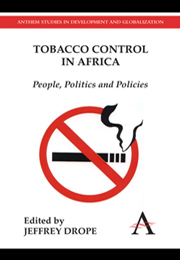Book contents
- Frontmatter
- Contents
- List of Figures and Tables
- Foreword
- Preface
- Acknowledgments
- List of Abbreviations and Acronyms
- 1 Introduction
- 2 The Political Mapping Process
- 3 Progress on Smoke-Free Policies
- 4 Taxation as a Tobacco Control Strategy
- 5 The Challenges of Implementing Bans on Advertising, Promotion and Sponsorship
- 6 The Pursuit of Packaging and Labeling Requirements
- 7 Burkina Faso
- 8 Cameroon
- 9 Eritrea
- 10 Ghana
- 11 Kenya
- 12 Malawi
- 13 Mauritius
- 14 Nigeria
- 15 Senegal
- 16 South Africa
- 17 Tanzania
- 18 Zambia
- 19 Conclusion: Tobacco Control in Africa – People, Politics and Policies
- Notes on Contributors
- Index
5 - The Challenges of Implementing Bans on Advertising, Promotion and Sponsorship
Published online by Cambridge University Press: 05 March 2012
- Frontmatter
- Contents
- List of Figures and Tables
- Foreword
- Preface
- Acknowledgments
- List of Abbreviations and Acronyms
- 1 Introduction
- 2 The Political Mapping Process
- 3 Progress on Smoke-Free Policies
- 4 Taxation as a Tobacco Control Strategy
- 5 The Challenges of Implementing Bans on Advertising, Promotion and Sponsorship
- 6 The Pursuit of Packaging and Labeling Requirements
- 7 Burkina Faso
- 8 Cameroon
- 9 Eritrea
- 10 Ghana
- 11 Kenya
- 12 Malawi
- 13 Mauritius
- 14 Nigeria
- 15 Senegal
- 16 South Africa
- 17 Tanzania
- 18 Zambia
- 19 Conclusion: Tobacco Control in Africa – People, Politics and Policies
- Notes on Contributors
- Index
Summary
Research indicates that comprehensive bans on tobacco advertising, promotion and sponsorship (APS) are effective in reducing tobacco consumption. Across the 12 African Tobacco Situational Analysis (ATSA) countries, there is considerable variation in terms of the countries' progress in instituting such restrictions. Several countries, including South Africa and Mauritius, have strong provisions in place, while some countries, such as Senegal and Ghana, have much weaker provisions. In most countries, there is a need for stronger legislation and/or regulation to create bans or to improve existing ones. In all countries, there is a significant need to improve efforts at enforcement, particularly considering the tobacco industry's ongoing efforts to subvert the bans.
This chapter has several broad goals. First, it lays out the Framework Convention on Tobacco Control (FCTC) interpretation of these bans so that the reader can understand the legal basis for the strategy. Second, it discusses the status of and variation in the bans in the 12 ATSA countries by meaningfully grouping countries together by performance and/or common challenges. Finally, it raises some of the most pressing issues facing this tobacco control strategy that require further research, discussion and/or resolution.
FCTC Definitions and Article 13
Building on research findings that advertising, promotion and sponsorship bans are effective tobacco control strategies, a comprehensive strategy has been enshrined in Article 13 of the World Health Organization's (WHO) FCTC to provide broad guidelines for country-level implementation and enforcement.
- Type
- Chapter
- Information
- Tobacco Control in AfricaPeople, Politics and Policies, pp. 63 - 78Publisher: Anthem PressPrint publication year: 2011
- 1
- Cited by



